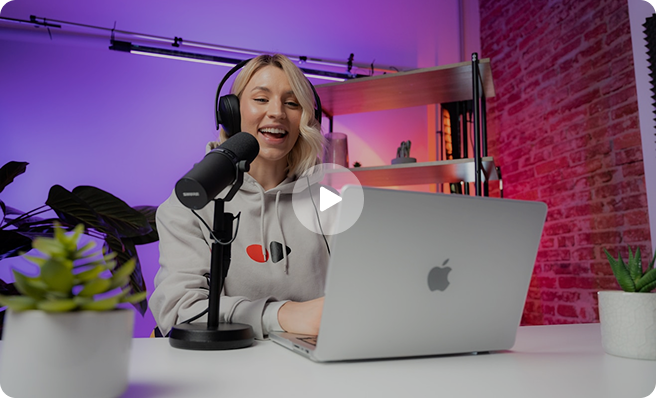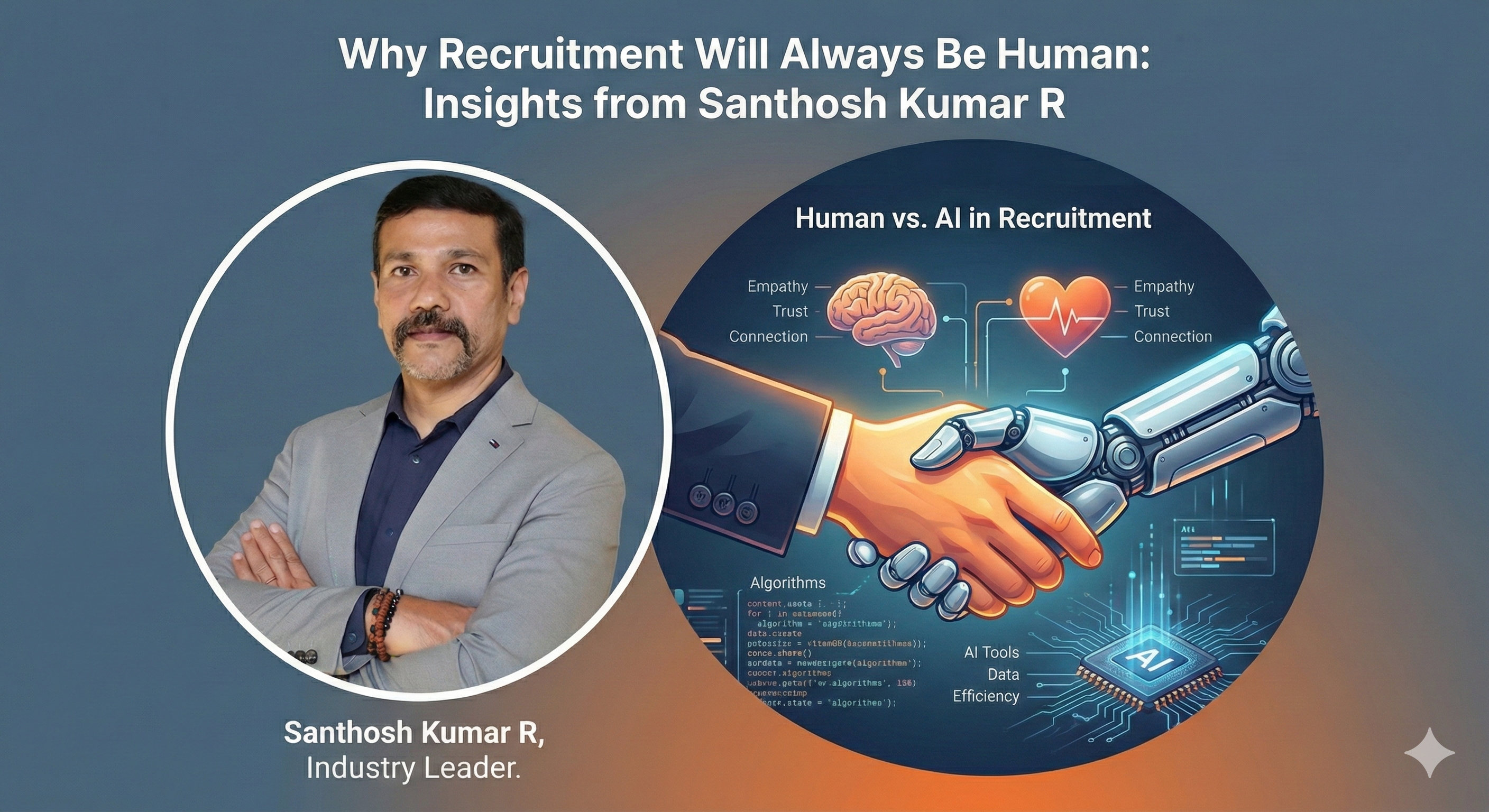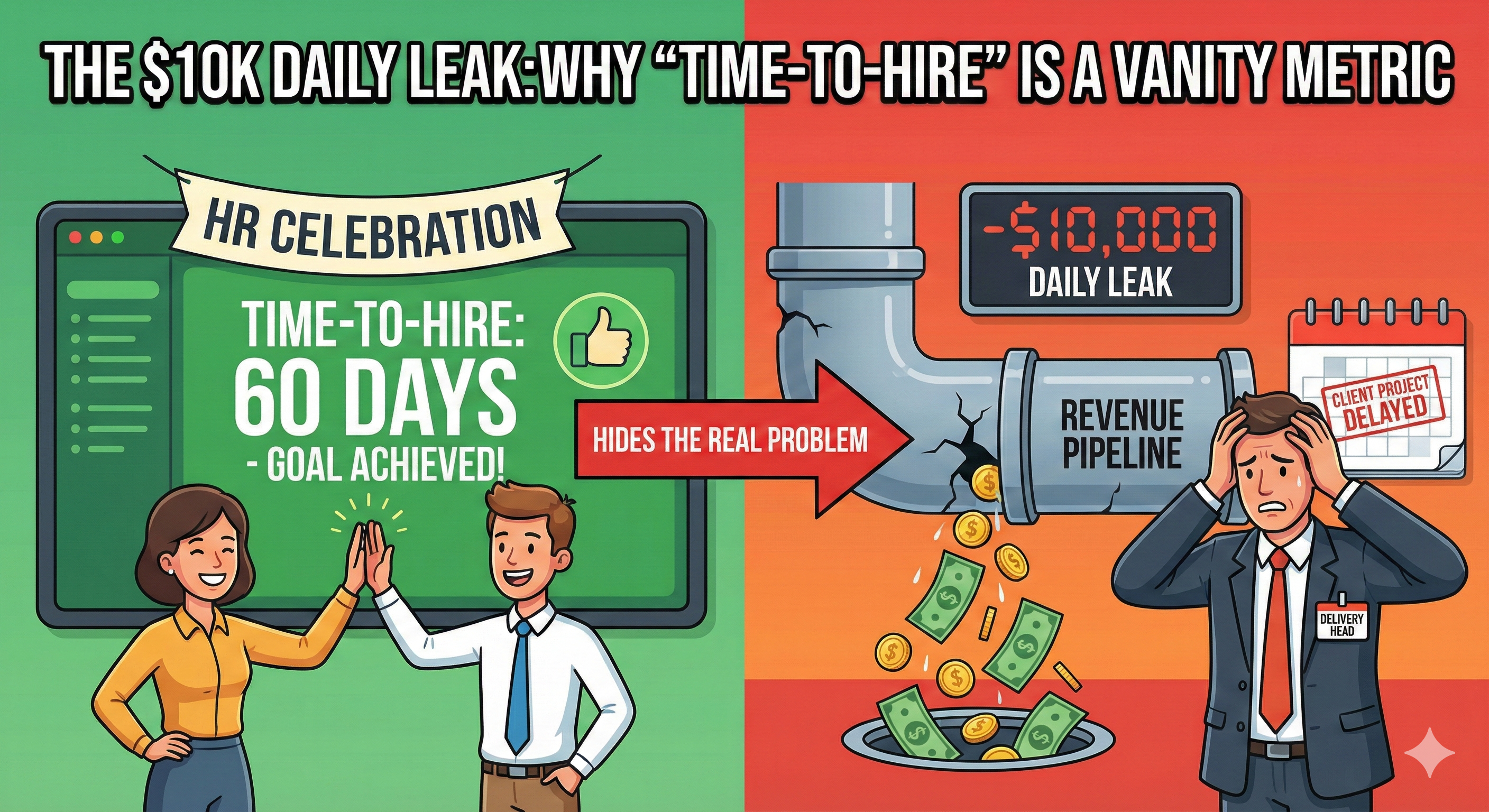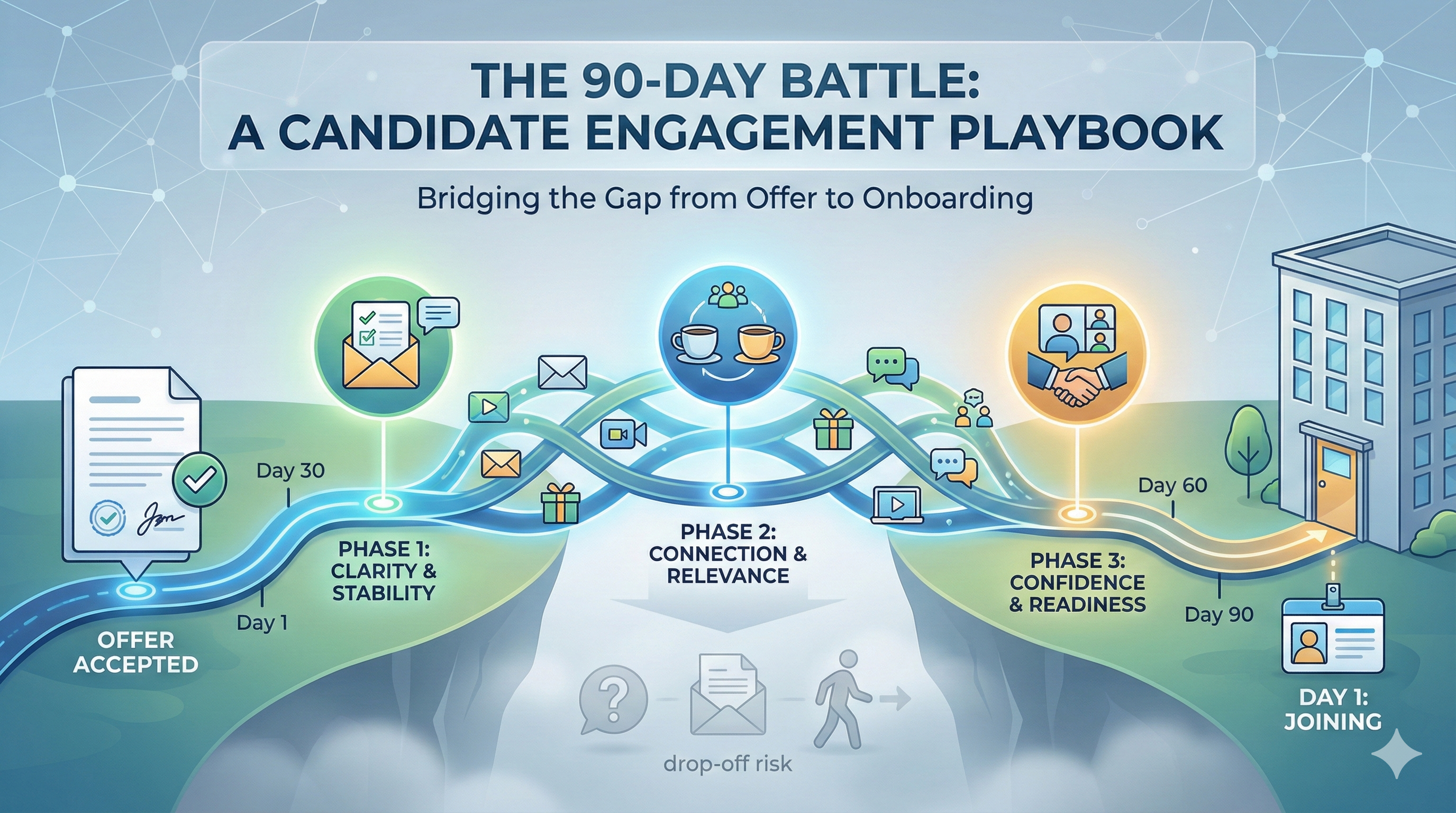Table of content
How To Train Interviewers For Mass Hiring And Volume Recruitment Events
High-volume hiring events—like campus drives, walk-ins, or bulk recruitment days—are often won or lost at the interviewer’s table. While recruiters focus on logistics, it’s the interviewers who shape candidate impressions, evaluate fit, and make decisions under tight timelines.
The problem is, many business managers walk into these events with little preparation. This results in inconsistent assessments, long delays, and frustrated candidates. This guide will show you how to prepare interviewers to perform with clarity and speed, so your hiring process is both efficient and candidate-friendly.
Train interviewers to handle the pace of mass hiring
When it comes to mass hiring or volume recruitment drives, the biggest challenge isn’t just the number of candidates—it’s the speed at which decisions need to be made. Interviewers often walk in after a long workday, expected to screen dozens of candidates with little guidance. Without preparation, assessments become inconsistent, feedback delays pile up, and promising candidates slip away.
The solution is to prepare interviewers not just on what to ask, but on how to operate in a high-pressure hiring event. A few practical steps include:
- Role-based orientation: give interviewers a short briefing before the drive on the role, must-have criteria, and deal-breakers. This avoids confusion later.
- Structured scorecards: replace ad-hoc note-taking with simple scorecards that push interviewers to rate on the same parameters.
- Mock sessions: run a quick practice round with sample questions so interviewers experience the pace and get comfortable.
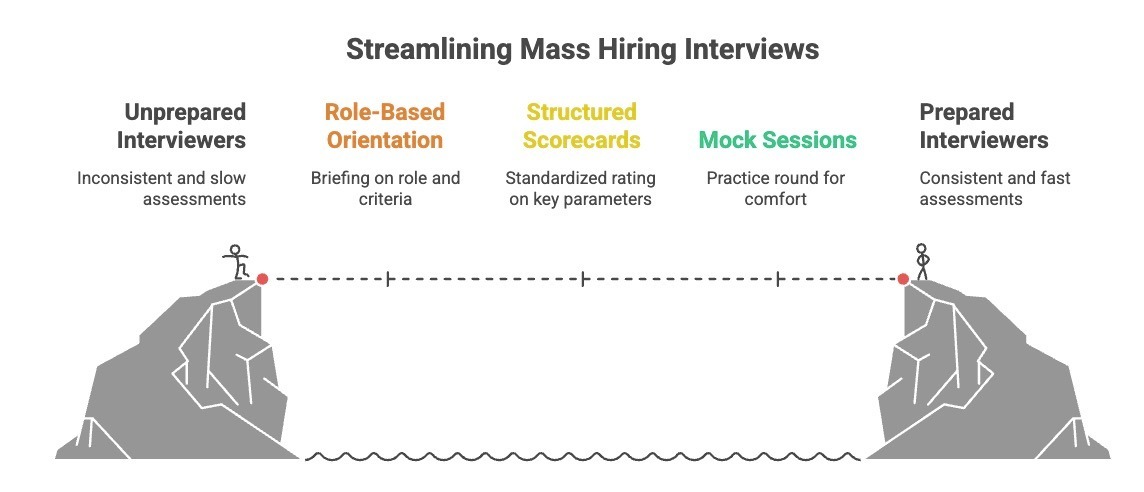
This preparation has a direct impact on both sides of the table. Candidates feel they’re being assessed fairly and consistently, while interviewers save time and effort by working within a clear framework. For enterprises, it means faster shortlists, better data from hiring events, and a stronger employer brand on campus or in walk-ins.
Give interviewers the tools to stay consistent
Even well-intentioned interviewers can lose consistency when they are under the pressure of a talent acquisition event. With dozens of conversations in a short span, it’s easy for small biases, incomplete notes, or memory gaps to creep in. The result is uneven evaluations and delayed hiring decisions.
To avoid this, give interviewers tools that reduce friction:
- Digital scorecards that capture ratings on pre-defined skills and attributes. This ensures every candidate is evaluated on the same criteria.
- Automated feedback reminders sent during the drive, so inputs are recorded immediately rather than days later.
- Central dashboards where recruiters can see feedback status in real time and follow up only when needed.
These tools help the interviewer's judgment. Instead of struggling to recall details at the end of a long day, interviewers focus on the conversation while the system takes care of structure and reminders.
For large-scale events like campus drives or walk-ins, this level of consistency means fewer disputes over shortlisting, quicker movement from interview to offer, and a smoother candidate experience. Over time, interviewers also develop better habits because the process itself nudges them toward timely, structured evaluation.
Build readiness before the hiring event begins
Interviewers perform best when they walk into a mass hiring drive with clarity, not confusion. Too often, they are briefed at the last minute or handed resumes with little context. A bit of preparation beforehand can make the difference between an organizedised event and a chaotic one.
Here is a simple readiness checklist you can run before any large-scale hiring day:
- Share the candidate profile and role criteria in advance so interviewers know what to prioritize.
- Circulate structured interview questions or themes aligned to the role, instead of leaving it to individual discretion.
- Provide a short refresher on unconscious bias to help interviewers make fairer judgments under pressure.
- Ensure logistics are sorted: who sits where, how many candidates per interviewer, and the escalation process if interviews run late.
- Brief them on the feedback submission process, whether through scorecards or drive automation tools.
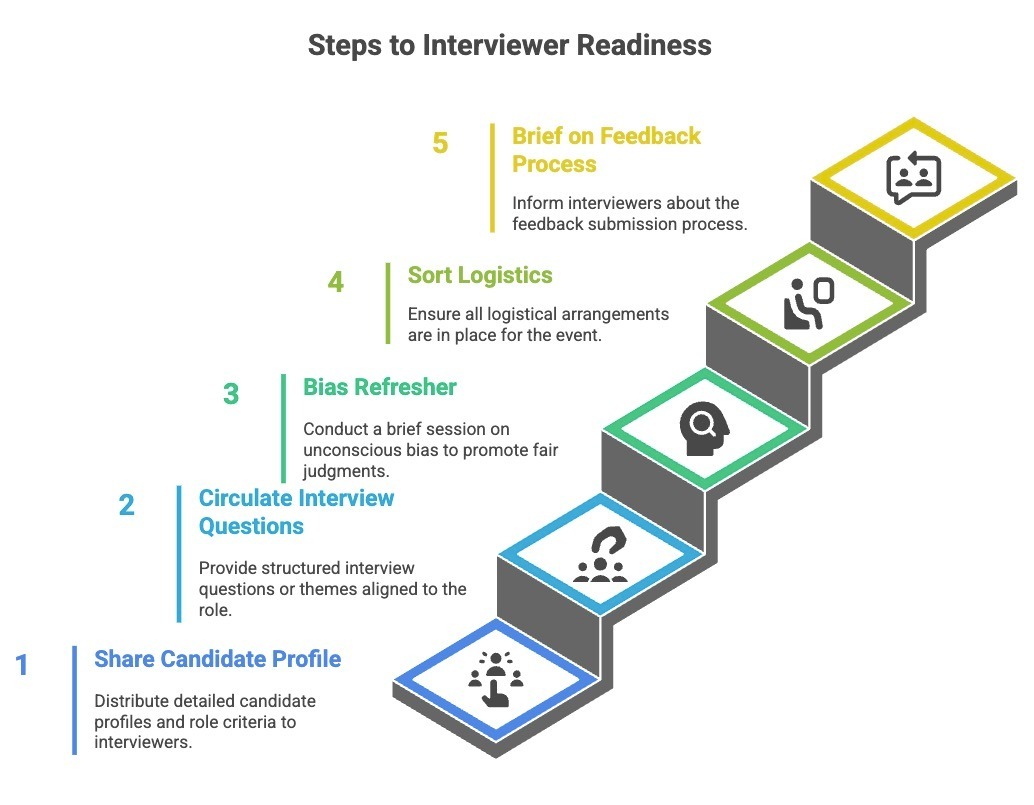
These small steps create consistency across the panel and reduce last-minute confusion. Candidates also sense the difference, as well-prepared interviewers come across as confident and professional, which strengthens the employer brand.
Enterprises that systematize interviewer readiness often find that hiring drives run on time, decisions are faster, and candidates leave with a more positive impression of the company. All of this lowers the risk of reneging later, because students and job seekers remember how they were treated at the very first touchpoint.
Sustain interviewer energy during long hiring days
Hiring drives can feel like a sprint at the start, but quickly turn into a marathon. Interviewers lose focus, decision quality dips, and candidates at the end of the day often get a very different experience than those who came in first.
One way to manage this is to think of interviewer stamina as part of your event design, not an afterthought. Simple design tweaks make a big difference.
Breaks matter. A ten-minute pause every couple of hours refreshes concentration levels and keeps conversations sharper.
Variety helps too. Instead of assigning one interviewer to repeat the same type of question all day, rotate responsibilities. It keeps them engaged and reduces bias that creeps in with repetition.
Another overlooked practice is mini-debriefs. Not full meetings, but two–three minutes where panelists compare notes and confirm alignment before the next set of candidates.
None of this requires additional budget or complex tools. What it does require is intention — planning the interviewer’s day with the same care you plan candidate logistics. When interviewers stay alert and consistent from start to finish, your enterprise gets more accurate hiring outcomes, and candidates leave with a fair impression of the process.
Strengthen data capture during hiring drives
Even the most skilled interviewers struggle if the larger process doesn’t support them. One hidden reason for reneges in mass hiring is poor data capture. When details about candidate preferences, availability, or communication history are scattered across spreadsheets and emails, it’s easy to miss early warning signs.
Think about the gaps that often cause trouble:
- Candidate logistics, such as preferred location or joining month not tracked properly.
- Incomplete interviewer feedback that leaves recruiters guessing about final decisions.
- Lack of visibility into which candidates are at risk of dropping out.
Training interviewers is only half the equation. Pair it with strong data practices and drive automation so that information flows in real time. For recruiters, this means quicker shortlisting and faster offer rollouts. For hiring managers, it reduces the frustration of chasing updates. And for candidates, it creates a smoother, more transparent journey—one that makes them less likely to reconsider your offer later.
Enterprises that treat data capture as a discipline during high-pressure hiring events usually find that both speed and offer acceptance improve. It’s the kind of operational foundation that quietly prevents many reneges before they even surface.
Making interviewer readiness easier with RippleHire
Getting interviewers ready for mass hiring or volume recruitment events doesn’t have to be overwhelming. What makes the difference is a system that reduces the chaos so interviewers can focus on evaluating talent. RippleHire brings drive automation, interviewer management, and real-time coordination into one place—helping you run talent acquisition events with confidence.
With RippleHire, interviewers spend less time on logistics and more time on assessing candidates fairly and consistently. For enterprises, this means faster decision-making, stronger candidate impressions, and fewer hiring delays during high-pressure drives.
Whether you’re running a campus recruitment event or a large-scale walk-in, RippleHire helps you equip your interviewers with the clarity and tools they need. Book a demo today and see how you can turn your next hiring event into a smoother, more predictable experience.
FAQs
Frequently Asked Questions
Why is interviewer training important for mass hiring drives?
In high-volume events, interviewers are under pressure to make quick, consistent decisions. Without training, assessments often become uneven and slow. Preparing interviewers ensures they know what to evaluate, how to give feedback on time, and how to deliver a consistent candidate experience. This directly impacts both hiring speed and employer brand.
How do you prepare interviewers before a volume hiring event?
Clarity is everything. Share candidate profiles, must-have criteria, and structured interview questions ahead of time. A short refresher on unconscious bias helps too. Logistics like seating plans, number of candidates per interviewer, and escalation steps should also be covered early. This prevents last-minute confusion and sets interviewers up for success.
What tools help interviewers stay consistent during hiring drives?
Digital scorecards are highly effective. They push interviewers to rate candidates on the same parameters instead of scribbling random notes. Automated reminders nudge them to submit feedback immediately, while central dashboards give recruiters visibility into progress. These tools reduce human error and keep the entire panel aligned throughout the event.
How can interviewers handle the pace of mass hiring without burning out?
Think of stamina as part of event design. Short breaks every couple of hours, rotating responsibilities, and mini-debriefs between rounds help interviewers stay sharp. This way, candidates at the end of the day get the same fair experience as those who arrive first, and interviewers avoid decision fatigue.
What’s the role of mock sessions in interviewer readiness?
Mock sessions act as quick practice runs. They simulate the fast pace of hiring drives, allowing interviewers to test scorecards, practice role-specific questions, and build comfort before the actual event. Even a 20-minute run-through improves confidence and reduces mistakes on the big day.
How does interviewer preparation improve the candidate experience?
When interviewers are trained and aligned, candidates feel assessed fairly and consistently. Quick, structured feedback avoids long waiting times, while professional conduct boosts confidence in the employer. These impressions matter—positive experiences during interviews reduce the risk of candidates reneging later.
Why is data capture so critical during high-volume hiring?
Missed details on preferences, availability, or interviewer feedback can cause delays and drop-offs. Real-time data capture prevents confusion and makes follow-ups smoother. For recruiters, it means faster shortlisting and offers. For candidates, it creates transparency, which builds trust in the hiring process.
How can RippleHire support interviewer readiness for mass hiring events?
RippleHire simplifies interviewer training and coordination through drive automation and real-time tools. Interviewers get digital scorecards, instant feedback capture, and automated scheduling, reducing manual chaos. Recruiters gain visibility into progress, while candidates enjoy faster decisions and consistent treatment. The result is smoother hiring drives and stronger outcomes.



